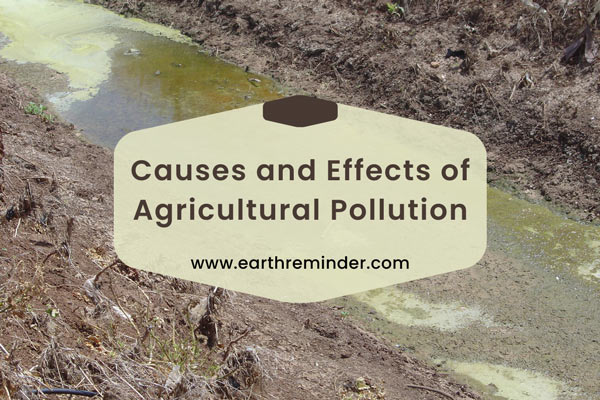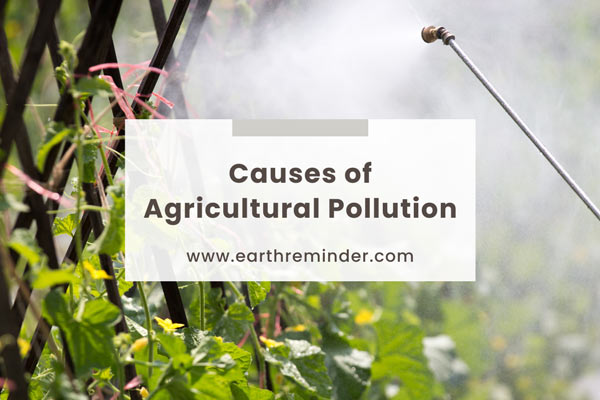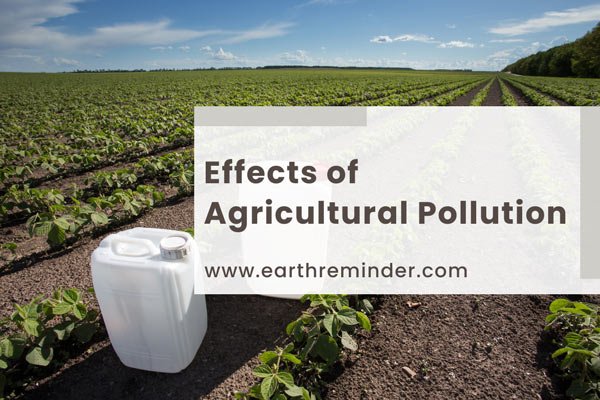Causes And Effects of Agricultural Pollution
There is no question that food is one of the most basic needs for everyone, and agriculture is the means to supply the demand for this crucial need. Traditionally, agricultural activities were completely dependent on natural processes; hence the land could retain its fertility for many years.
Unfortunately, in the past few years, farming methods have changed with the use of modern techniques. These modern techniques have ended up causing agricultural pollution. A general perception is that pesticides and fertilizers are the only causes of agricultural pollution, but there are many other sources that affect the ecosystem.
Here, we will discuss the major causes and effects of agricultural pollution.
Table of Contents
What Are the Causes of Agricultural Pollution?
Let’s see diverse reasons for it:
Use of Fertilizers and Pesticides
Pesticides and fertilizers are one of the primary sources of agricultural pollution. The purpose of these fertilizers and pesticides is to kill the local pests that damage the crops. When these pesticides are sprayed on crops, some chemicals get absorbed by the soil, water, and plants.
These chemicals are quite harmful as they contaminate the water supply and soil. When animals eat these leftover crops after harvesting, it affects their health. Sometimes these crops may also affect our health when we consume them.
An Excessive Amount of Nutrients
Fertilizers and manure used for agricultural purposes may not show direct toxic effects but may contain excessive amounts of chemical nutrients like phosphorous and nitrogen. High nutrient levels are one of the major causes of agriculture pollution.
Nutrients are necessary for plants to grow, but when there’s too much of them, it can lead to water pollution. When nutrients enter waterways, they can cause algal blooms. These blooms can deplete the oxygen in the water, which can kill fish and other aquatic animals.
Excessive nutrients can also cause problems for people who rely on wells for their drinking water. They can also make it difficult for people to drink the water because of the bad taste and smell.
Rainwater carrying these nutrients into rivers, lakes, etc., negatively impacts water quality. Therefore, the nutrient balance of the water changes, affecting the aquatic ecosystem drastically.
Use of Contaminated Water for Irrigation Activities
The groundwater sources, rainwater, and other water bodies are the primary sources of irrigation. Most of these sources are already polluted due to the disposal of industrial and agricultural wastes. This water can contain pesticides, herbicides, and other harmful chemicals.
As a result, the water becomes contaminated when organic compounds & heavy metals get dissolved in water such as lead, mercury, cadmium, etc. It pollutes the process of agriculture when used for irrigation activities.
These chemicals can further degrade the soil and air. For example, when this contaminated water evaporates, it can also contaminate the air. It can also cause health problems for animals and humans.
Soil Erosion Through Improper Agricultural Activities
The soil has many layers, but for agriculture purposes, the top layer is useful. The improper agriculture practices are losing the soil quality day by day, affecting soil fertility as well. The upper layer used for farming purposes is getting eroded by different sources like overgrazing and deforestation. Natural factors are also responsible, like wind and water.
This can also happen when farmers don’t implement proper crop rotation or when they clear too much land for farming. As a result, the nutrients in the soil are lost, and the field becomes less productive.
Soil erosion is the other root of agricultural pollution. Eventually, due to soil erosion, the sediments deposited on the surface of the water bodies began to block the natural channels of these water bodies, thereby preventing them from moving freely as they usually do.
Traces of Heavy Metal
Pesticides, fertilizers, and industrial wastes sometimes contain some traces of heavy metals like cadmium, lead, arsenic, etc. These heavy metal traces get dissolved with soil, mixed with water sources, sucked by the groundwater, and sometimes absorbed by the crops.
It is a growing concern in agricultural communities. Several potential sources of heavy metal contamination include runoff from mines, factories, and landfill sites. When animals and human beings consume these crops, the heavy metals present in them affect their health negatively. In some severe cases, it may also cause premature death.
Growth of Harmful Weeds
Growing trends of foreign crops and lack of natural species are also contributing to the causes of agriculture pollution. The entry of these exotic crops is thus affecting the local population with new health issues.
It affects human health and damages the native ecosystem by doing permanent alterations. These weeds consume the nutrients in the soil, leaving behind toxins that can pollute the soil and water. This can lead to a decrease in crop yield and quality.
Livestock Health
Traditionally, the farmers used to keep livestock. The cattle, sheep, and chickens were common animals of livestock. These animals used to depend on a natural diet, such as the waste material left after harvesting the crops. In this way, these animals were also helping in keeping the farm quite healthy.
These days these animals are mostly dependent on an unnatural diet, affecting the agricultural processes and their health. When animals are unhealthy, they produce waste that can pollute the environment. Livestock health problems can be caused by pathogens, parasites, and poor nutrition.
Waste from livestock can contaminate water supplies and soil. Animals that are raised for food often live in unsanitary conditions and are given large amounts of antibiotics to prevent them from getting sick. The use of antibiotics can also lead to the development of antibiotic-resistant bacteria. These antibiotics end up in the environment and can cause problems for plants and animals.
What Are the Effects of Agricultural Pollution?
Let’s see several impacts of it:
Agricultural Pollution Leads to Various Health Issues
Agricultural pollution is directly related to causing multiple health issues to us. When the chemicals from different manure, pesticides, and fertilizers are dissolved in water bodies (especially in groundwater), they end up mixing with drinking water.
We consume contaminated water that contains harmful chemicals, toxins, metals, etc., that may cause various health problems. These chemicals can further enter the body through the skin or by inhaling them.
Once they enter the body, they can trigger a variety of health problems such as respiratory problems, skin irritation, and headaches. Farmers who are exposed to these chemicals on a regular basis are at a higher risk for developing these health problems.
Degradation of Soil Fertility
Soil fertility is important for plant growth, and when it is degraded, plants may not be able to grow as well. Chemicals used in the form of pesticides or fertilizers are basically used to protect crops from pest attacks.
These chemicals also spoil the soil’s fertility, which remains unchanged for many years. These chemicals further disturb the soil’s chemistry and destroy the soil’s microorganisms which play an important role in maintaining soil fertility. This can lead to a decrease in crop yields and an increase in the cost of food production.
Agricultural Pollution Affects Aquatic Life
Pesticides and herbicides can contaminate water sources, and fertilizers can cause excessive growth of algae and other aquatic plants. These chemicals can kill aquatic plants and animals, and they can also disrupt the delicate balance of the ecosystem. In some cases, agricultural pollution can also cause deformities in fish and other animals.
In addition, agricultural runoff can carry sediment and other pollutants into waterways, which can damage the habitat and make it difficult for fish and other animals to survive.
Eutrophication
Eutrophication is the Process by which a water body becomes overly enriched with minerals and nutrients that promote the growth of aquatic plants and algae. The excessive nutrients dissolved in water from agricultural pesticides, fertilizers, herbicides, and some other agrochemicals are one of the reasons for eutrophication. This process can lead to the depletion of oxygen in the water, making it difficult for fish and other aquatic creatures to survive.
Affects Long-Term Agricultural Production
Pesticides and other chemical products are used to perform various agricultural activities, but the continuous use of these chemicals affects long-term agricultural production. These chemicals stay for a long time in soil, underground water, etc., that may kill the beneficial microorganisms present in soil affecting the soil quality; This can ultimately lead to decreased crop yields and create problems with food quality and safety. It can also cause damage to plants and animals and negatively impact human health.
Agricultural Pollution Leads to Air Pollution
When farmers use harmful pesticides and fertilizers, they unknowingly release harmful chemicals into the air. These chemicals can cause respiratory problems, skin irritation, and other health problems.
Some more agricultural activities lead to air pollution, such as burning fossil fuels in tractors, emission of gases through livestock & fertilizers, etc.
In addition, agricultural pollution contributes to climate change by releasing greenhouse gases (from machinery used for farming purposes) into the atmosphere. The gases emitted from all these sources are eventually affecting the atmosphere by polluting the air.
Conclusion
Agricultural pollution is a pressing environmental issue that demands our attention. By understanding the causes and effects of this type of pollution, we can help in reducing agricultural pollution. We have to become more aware of the issue and by making some simple changes in the way we farm, we can go a long way towards cleaning up our mother Earth. By doing so, we can protect not only our environment but also the health of those who live in and rely on agricultural areas.


